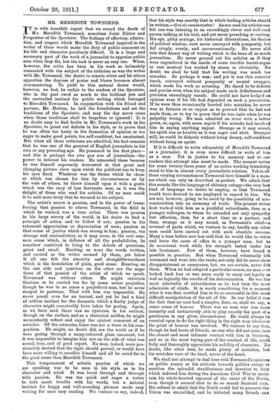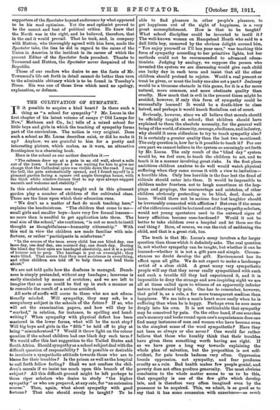MR. MEREDITH TOWNSEND.
IT is with heartfelt regret that we record the death of Mr. Meredith Townsend, sometime Joint Editor and Proprietor of the Spectator. The feelings of affection, admira- tion, and respect which Meredith Townsend inspired in the writer of these words make the duty of public comment on his life and character peculiarly difficult. It is a large and
_necessary part of the work of a journalist to appraise public
men when they die, but the task is never an easy one. When, however, the critic has been in his work so intimately connected with the subject of the criticism as was the writer with Mr. Townsend, the desire to remain silent and let others apportion the degrees of praise and blame becomes almost overmastering. To yield to this natural desire would, however, we feel, be unfair to the readers of the Spectator, who in the past owed so much to the brilliant pen and the unrivalled instinct for public writing which belonged to Meredith Townsend. In conjunction with his friend and partner, Mr. Hutton, he laid the foundations and set the traditions of the Spectator, and may the day never come when those traditions shall be forgotten or ignored ! It is no doubt easy to find faults in Mr. Townsend's work in the Spectator, to point out defects in his style, or to prove that be was often too hasty in the formation of opinion or too eager to make good points, too self-confident, too omniscient. But when all these criticisms are admitted, the fact remains that he was one of the greatest of English journalists in his own or any preceding age. He possessed in the first place— and this is perhaps the sine qua non of journalism—the power to interest his readers. He interested them because he was himself supremely interested in that great and changing picture show upon which the publicist has to keep his eyes fixed. Whatever was the theme which he chose or which was chosen for him by circumstances or by the wish of others, he threw himself upon it with a gusto which was the envy of less fortunate men, as it was the delight of those who read his articles. Of no man could it be said more truly that he warmed to his subject.
The artist's secret is passion, and in the power of trans-
ferring that passion to others Townsend, in the field in which he worked, was a true artist. There was passion in his large survey of the world, in his desire to find a principle of action and to follow it out; passion in his vehement appreciation or depreciation of men; passion in that sense of justice which was strong in him ; passion, too strange and contradictory as it may seem, in the cool com- mon sense which, in defiance of all the probabilities, he somehow contrived to bring to the debate of questions, great and small. Exciting as were the words written, and excited as the writer seemed by them, yet below it all one felt the sincerity and straightforwardness which is the foundation of plain, good sense. Humbug on the one side and cynicism on the other are the nega- tions of that passion of the artist of which we speak. Townsend was without either. He might entertain Illusions or be carried too far by some minor prejudice, though he was in no sense a prejudiced man, but he never stooped to pretence. That with him was impossible. He never posed, even for an instant, and yet he had a kind of artless instinct for the dramatic which a faulty judge of character might conceivably have taken for posing. Again, as we have said, there was no cynicism in his outlook, though on the surface, and as a rhetorical artifice, he might momentarily reflect and enjoy the cynical comment of an outsider. Of the saturnine there was not a trace in his com- position. He might, no doubt did, see the world as if he
were gazing through a many-coloured glass casement, but it was impossible to imagine him not on the side of what was sound, true, and of good report. No man, indeed, more pas- sionately desired that the right should prevail, or would have been more willing to sacrifice himielf and all he cared for to the good cause than Meredith Townsend.
This temperament of artistic passion of which we
are speaking was to be seen in his style as in his character and mind. It was laced through and through with passion. He was too quick and eager a writer to take much trouble with his words, but a natural instinct for happy and well-sounding phrases made easy _ writing for once easy reading. We venture to say, indeed, that his style was exactly that in which leading articles should be written.-0 aisle omnia want! As one read his articles one felt one was listening to an exceedingly clever and well-read person talking at his best, and yet never preaching or orating. His apt, pithy sayings, his historical illustrations, his flashes of political wisdom, were never conveyed with pomposity, but fell crisply, evenly, and unconventionally. He never slid into that dreary way of writing which is the bane of so much journalism. He never ground out his articles as if they were engendered in the inside of some terrible barrel-organ or vast musical box worked by steam or electricity. No doubt we shall be told that his writing was much too oracular. So perhaps it was ; and yet it was this oracular touch, conveyed without pomposity or mental swagger, which made his work so arresting. He dared to be definite and precise even when his subject made such definiteness and precision exceedingly unsafe. He could not have hedged an opinion even if his life had depended on such a precaution. If he were thus occasionally hurried into mistakes, he never was so fatuous or so unjust as to pretend that he had not made them, or to try to prove that he was right when he was palpably wrong. No man admitted an error with a better grace, or, again, with more regret if his mistake had involved him in saying anything unjust. Strange as it may sound, his spirit was as humble as it was eager and alert. Stranger still, he could be didactic without being dreary, self-confident without being an egoist.
If it is difficult to write adequately of Meredith Townsend as a journalist, it is even more difficult to write of him as a man. Yet in justice to his memory and to our readers this attempt also must be made. The present writer for some twenty-three years of an active working friendship stood to him in almost every journalistic relation. Yet in all these varying circumstances Townsend bore himself in a man- ner which can only be described as perfect. We admit that this sounds like the language of obituary eulogy—the very last kind of language we desire to employ, or that Townsend would have desired to see employed in regard to him. We are not, however, going to be awed by the possibility of mis- construction into an economy of truth. The present writer first worked with him as a youthful subordinate, then as a younger colleague, to whom he extended not only sympathy but affection, then for a short time as a partner, and then, strange as it may sound, as Townsend's chief—a reversal of parts which, we venture to say, hardly any other man could have carried out with such absolute success. Many a man before now has said that he would like to retire and leave the cares of office to a younger man, but to do occasional work while his strength lasted under his late lieutenant. Few of them, however, have found it possible in practice. But when Townsend voluntarily left command and went into the ranks, not only did he never show disappointment or annoyance, but, we are certain, never felt them. When he had adopted a particular course, no man ever looked back less or was more ready to carry out loyally as well as logically the results of his determination. He was the most admirable of subordinates as he had been the most admirable of chiefs. It is worth considering for a moment what it was that enabled him to be so successful in this most difficult manipulation of the art of life. In our belief it was the fact that no man had a simpler, finer, or, shall we say, a saner sense of honour. There was no man who was more instantly and instinctively able to play exactly the part of a gentleman in any given circumstance. He could always be counted upon to do the right thing in the right way whenever the point of honour was involved. We venture to say that, thcugh he had hosts of friends, no one who did not come into the closest and most intimate contact with him in business, and so in the most trying part of the conduct of life, could fully and thoroughly appreciate his nobility of character. No doubt, like other men, he made plenty of mistakes, but his mistakes were of the head, never of the heart.
We shall not attempt to deal here with Townsend's opinions on public events or his attitude towards politics except to mention the splendid steadfastness and devotion to duty which induced him during the American Civil War to main- tain his whole-hearted espousal of the cause of the North, even though it seemed that to do so meant financial ruin. His refusal to admit that the North could fail to preserve the Union was unqualified, and he irritated many friends an supporters of the Spectator beyond endurance by what appeared to be his mad optimism. Yet the mad optimist proved to be the sanest and best of political critics. He knew that the North was in the right, and he believed, therefore, that in the end it would prevail. That he took, and, in company with Hutton, who thoroughly agreed with him here, made the Spectator take, the line he did in regard to the cause of the Union in America is the incident in its career of which the present Editor of the Spectator feels proudest. Thanks to Townsend and Hutton, the Spectator never despaired of the Republic.
Those of our readers who desire to see the facts of Mr. Townsend's life set forth in detail cannot do better than turn to the admirable obituary which is to be found in Tuesday's Times. His was one of those lives which need no apology, explanation, or defence.











































 Previous page
Previous page